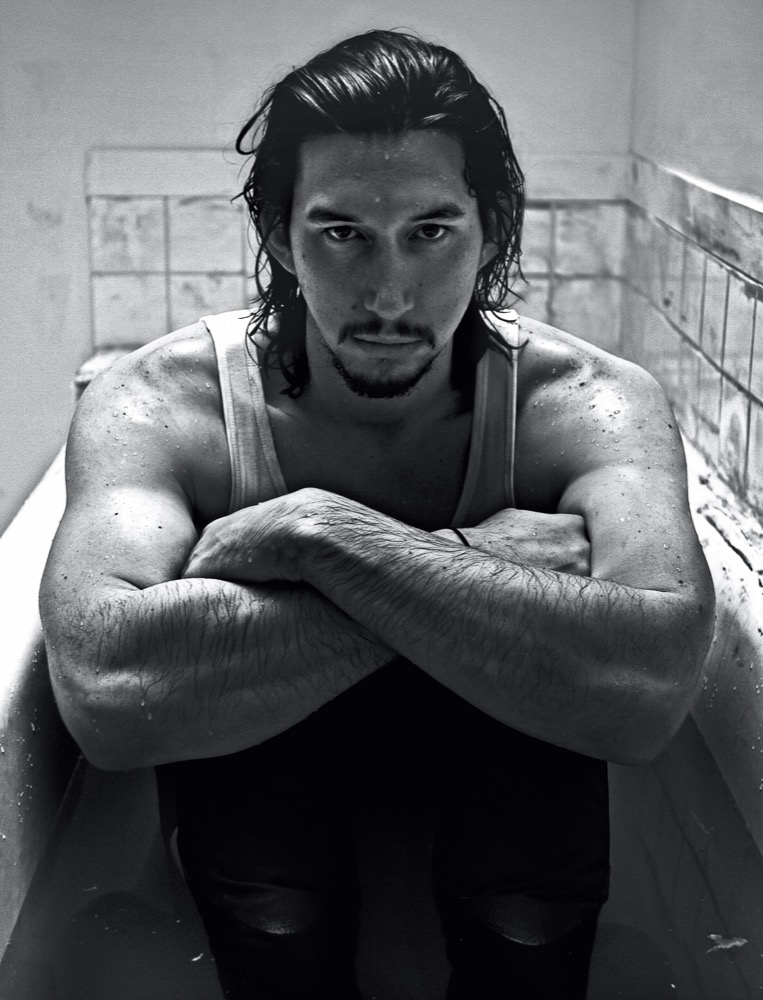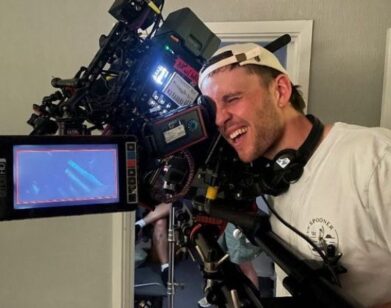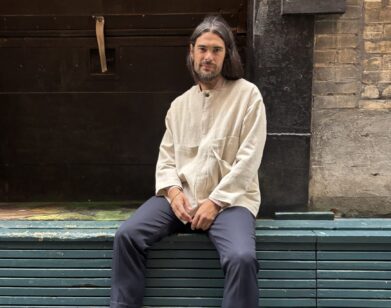Adam Driver
Savvy and cynical consumers of culture as we may be these days, watching Adam Driver for the first time still felt, somehow, new. His menace and mercy and general lanky amiability in that first flush, when he appeared as Hannah’s boyfriend on the first season of Girls (which returns for its sixth and final season in winter 2017), shone with that instantly recognizable urgency of unique promise, and almost immediately made Driver an interesting, dark-horse casting choice on the indie-drama circuit. His subsequent performances, in the Coen brothers’ Inside Llewyn Davis (2013), in the charming This Is Where I Leave You (2014), and in a pair of Noah Baumbach‘s tales of modern New Yorkers, Frances Ha (2013) and While We’re Young (2015), could easily have priced him out of art-house and into exclusively multiplex fare. Indeed, his talent and sort of Modigliani Mr. Potato Head appearance are too perfect a fit for the Fellini-esque cast of characters as established by George Lucas in the Star Wars universe, and Driver really couldn’t not be the temperamental Kylo Ren in the J.J. Abrams reboot of the franchise-and in Rian Johnson’s forthcoming follow-up, out in December 2017. But what Driver has chosen to do in his new position, even with global, mega-merchandisable fame, is even more interesting. After a deft appearance in Jeff Nichols‘s sci-fi thriller Midnight Special earlier in 2016, Driver has turned in a couple of drastically different performances, working with two of the most iconoclastic American directors of all time—as a poetry-writing bus driver in Jim Jarmusch’s downbeat Paterson, and in Martin Scorsese’s long-gestating Silence, as a 17th-century Portuguese Jesuit priest who, along with a fellow priest played by Andrew Garfield, is pushed to incredible, anorexic extremes in their travels to the far side of the world, and further still once in the unforgiving empire of Japan, in search of their mentor (Liam Neeson). All that and he’s set to star in the newest version of Terry Gilliam‘s hexed Don Quixote movie.
This docket might be surprising if it were anyone else, but for Driver, who is surely one of the proud, the few, the brave former Marines to have studied at Julliard, nothing really surprises us anymore. As he tells his pal Baumbach, he’s just trying to cover all of his options.
NOAH BAUMBACH: It’s important that the readers understand that we also talk for real.
ADAM DRIVER: Yes, right, as people.
BAUMBACH: We could talk about how we met. Why don’t you tell me your perspective of our meeting, and I’ll tell you mine?
DRIVER: Well, I knew your movies. And there was an audition for Frances Ha … but it wasn’t called that at the time. I don’t think even you knew then exactly what it was you guys were creating. I came in and read for you. And that was it.
BAUMBACH: I can’t remember. It may not even have been the actual scenes that we did, was it?
DRIVER: I don’t think so. I had no idea what it was.
BAUMBACH: I was kind of figuring it out with Greta [Gerwig] as we were doing it. And I started auditioning people pretty early when it was even less formed. But I had heard good things about you. I remember talking to Lena when she was casting Girls, and she was talking about how good she thought you were. I don’t think the first season was even out yet, because I hadn’t seen you do anything. And I remember being very excited by your audition. And then I remember your first day on the set. We were shooting a real party.
DRIVER: I was actually waiting across the street because I got there early. You guys were coming from a shoot in the subway, I think. And I remember expecting, like, a crew of people to show up; it was just you four. [laughs] There was nobody else. I’m like waiting for this group of trucks and things to pull up. And then you guys just walked up the street. I’m like, “Oh, there they are.” And that was my first day.
BAUMBACH: I had that feeling, too, when I saw you, feeling bad like we weren’t producing an actual movie for you. It was like, “Trust me, this is legit.” I had had this sort of great idea that we’d actually get the guy who lived at the location to have an actual party that we would shoot at. It seemed like a good idea in the planning. But then he kind of threw a fit and kicked us out at a certain point. [laughs]
DRIVER: Really?
BAUMBACH: But we’d gotten enough of it, yeah.
DRIVER: I had no idea. I just assumed everyone was there for the movie. I had no idea that that was an actual party. [both laugh] Well, now it makes sense that no one knew what the fuck I was talking about. I just showed up and started demanding things.
BAUMBACH: “Can I get a Perrier?” No, you were a very good sport. So we met in the audition room, but I feel like we really met the day of that party.
DRIVER: I had another favorite moment in shooting that night—Sam [Levy, cinematographer] was trying to light something. And now that I know you were under pressure of getting kicked out, someone throwing a shit fit … But I remember there was a PA standing nearby who was wearing a white T-shirt. So you told him to stretch out his T-shirt to bounce light off. And I’m like, “Yeah, this is it. This is great.” [both laugh]
BAUMBACH: I knew I liked you when you liked that as a thing.
DRIVER: I was doing a play at the time and then shooting with you guys all night.
BAUMBACH: Right. Was that the play you were doing with Frank Langella?
DRIVER: Yeah. Man and Boy.
BAUMBACH: I remember you came one day, when we were shooting you guys at breakfast, and you were feeling really bad because you felt like you had a bad rehearsal.
DRIVER: That was just a window into every day. [Baumbach laughs] I feel bad about it every day. But, yeah, I was tired.
BAUMBACH: I think that’s true of you, that you invest yourself very emotionally. And I’m not talking about process or inhabiting the character or anything. I mean, just the work of it—acting and rehearsing or whatever. I feel like it stays with you after. If you don’t feel good about something, you don’t shake it off easily. Would you say that’s true?
DRIVER: I definitely let it get to me if it doesn’t go well. But what I like about your sets is that we get so many chances to do it again and again. I love the idea of doing a lot of takes because there’s so many different ways that you can play scenes. And we have clear boundaries, where the script is the script, you know? Since I came from a theater background, that made so much sense to me; that you thought a lot about these words and they’re very important. I mean, you don’t say this, but these are the words. These are the boundaries that you can play in. And the meaning of them is infinite. So I feel less anxious I guess when I leave your sets. But oftentimes I leave a set and there are so many different ways to have played a scene that I think of later, when I’m more relaxed and not distracted. I go through a mourning period, like, “Oh, God, we’ll never get to go back and do it again.”
BAUMBACH: I mean it as a compliment. I’m not saying you’re a depressive.
DRIVER: [laughs] Yeah, what the fuck?
BAUMBACH: Yes, you have those days that you don’t get out of bed. Why don’t you talk about that?
DRIVER: Yeah, I’m glad you’ve picked this time to … [laughs]
BAUMBACH: I waited until we’re being recorded to talk about it … But I know what you mean, and I think we’ve connected about the ways we like to work, that there’s a kind of loose but focused way of going at it. If we do a bunch of takes and you don’t want another one, I feel confident that I have it. [laughs] You don’t generally like to leave an option unexplored.
DRIVER: Right. I mean, maybe as I get older, I’m getting tired, or my anxiety and the kind of self-imposed torture in working on it is getting less and less. Do you normally associate torture with creating things? Or do you just treat it like, “I’m going to go punch in and do my job, and if I don’t figure it out, there’s always tomorrow”? Maybe torture is too strong a word. Is misery par for the course of creating something?
BAUMBACH: [laughs] Certainly shooting something. Shoots are so fraught with built-in limitations: from this time to this time in this place to get this scene. And I do think there are plenty of actual things to be anxious or concerned about under those circumstances on any shoot. But the other anxieties, neurotic anxieties … It’s not that I avoid them, but I don’t find them useful to a creative environment. I like to try to keep things as relaxed and easy as possible. I mean, movies generally attract a lot of people who like to cause fires, so they can later try to put them out. But I don’t like that kind of thing.
DRIVER: Yeah. You are very, like, economical. That sounds like a bad word, but economical with the time you’ve spent, which is always helpful.
BAUMBACH: The Frances model was invented to try to keep things even less pressureful in terms of having to get the day done. It was set up so that if the guy pitches a fit and throws us out of his house, we could go re-create another party.
DRIVER: [laughs] Which was in response to just doing it the other way and being like, “I don’t like this”?
BAUMBACH: It’s kind of a crazy art form, movies, in that you have to get it right the day you do it, generally.
DRIVER: Which involves corralling a bunch of people at their most stressed. [laughs] I just worked on this set where the atmosphere was playful the entire time, and I’m not used to that—where you have to talk to the other actors in between takes or go hangout socially, which I thought would throw me off—but it turned out I liked that. So I don’t really come in with a set way of working, I guess. I always feel out the vibe. Like, “I’m going to adapt to what this is.” There’s not, like, a mood that I prefer—other than people showing up and on time, probably. [both laugh]
BAUMBACH: But now that you’ve done this enough, are there things that you really do feel like you need? I don’t necessarily mean, like, amenities brought to your trailer. I mean, like, needing this amount of sleep or this amount of exercise …?
DRIVER: The only thing I know that makes me feel comfortable is to know as much as I can. Not like what the shots are going to be, but knowing enough about my character that I can forget those things. And more specifically, my lines. I have to know my lines. I have to know something really well, so I can forget it when we’re doing it. And there is comfort in knowing, “Okay, there’s not another stone that I could have overturned.”
BAUMBACH: I also realize how much I rely on the actors to really know the lines because I tend to forget what they are exactly, even though I’ve written them. I don’t have them memorized. But when it’s going well, there is that point where the actor starts to know more about the character than I do. I definitely felt that was true with us.
DRIVER: That’s interesting to hear you say that because I feel like you know them very well but maybe … like, I would get texts from you the night before or maybe the morning of shooting, where you have a line change, but it’s something very specific. Like, “It shouldn’t be McDonald’s, it should be Burger King,” or something. And I remember watching you in between takes, just checking out the script before you’re about to do the scene, to kind of refresh your memory about everything that was going on.
BAUMBACH: That’s all true. It’s like you were saying, I need to be as prepared as possible from my end, so that I can be reacting to all the other things—the actor, the dog. There were a couple of days on While We’re Young where we talked about this, when you’re in a good groove and the actor really understands the part and comes as prepared every day as you are and is so inside it. And then there’s the day where, for whatever reason, it’s just a harder slog. And I feel like those are the days where all the preparation and everything becomes more necessary because you have to find a third route there.
DRIVER: Yeah. At the end of whatever we’re doing, I always feel like I want to go back and start over again because now I have a better sense of what it is. I feel that with everything. Like, if you’re doing like a long run of a play and you’re doing it seven shows a week, at the end of it, I want to go back and start from the beginning. On While We’re Young, you gave me a physical thing to hold on to from the beginning and that was helpful. When I wasn’t making sense of it, I would go back to this physical thing, this idea of water, where he moves into a room and then he moves out of the room and it’s all very fluid. I found that helpful as a checkpoint. Oof, God, I was like, “Don’t ask me any questions about process.” And then here all I’m doing is talking about process. [laughs]
BAUMBACH: Sorry.
DRIVER: No, no, no, it’s my fault.
BAUMBACH: But while we’re here, do you remember when we did press together in Paris and you talked about acting being a benign rebellion? Or is this something you’ve talked about a lot?
DRIVER: No, it’s not. I mean, that day with you, and then in every interview since. But other than that …
BAUMBACH: Well, I’ve attributed it to you, but have now just outright stolen it. Because I do think it’s a very good way to describe what a great actor does. You’re both acknowledging the authority of the director and the necessity of the actor to push back and find their own voice.
DRIVER: I always found something strangely paternal about the director-actor relationship. Actors want so much approval. And I’m looking to you to tell me it’s good. I want you to be happy and like it all. But at some point, I distrust you, like, “Well, they don’t know me as well as I know myself. I know my potential. If it’s not good, then I have to fight to make it better.” And I start distrusting everybody because you’re insecure. So I start to rebel against what’s happening, to kind of shock my system a bit. Not rebel like I don’t show up on time or I show up drunk or something … Now we’re never going to work together again. [both laugh] It’s just a way to take ownership of it for myself.
BAUMBACH: I like that.
DRIVER: I’m looking out my window … They’re always doing stuff for the holidays—Halloween’s a big one. Do they trick-or-treat in your building? One year, Joanne [Tucker, Driver’s wife] and I bought $100 worth of mini candies, thinking that all the kids in the neighborhood were going to come by—not thinking, obviously, that no one’s going to let fucking strangers up into our building. For some reason, we didn’t put that together. We had, like, four kids come by. [both laugh] This one princess took all the candies we had hand over fist. I actually fucking hate Halloween.
BAUMBACH: It must be cool to see all these kids dressed as Kylo Ren on Halloween.
DRIVER: Yeah. I was dropping my wife off outside our building and I saw this mom holding a lightsaber—like, my lightsaber—and scarily accurate. Like, life-size. And she was handling it like she’s handled it a million times. She was juggling four kids who were all running in different directions, and she had three different bags and this lightsaber. Suddenly, the things that are great about this job came into full focus.
BAUMBACH: When you were growing up, were there performances in movies or the theater that you really connected with?
DRIVER: It depends what age. When I was growing up, it was all film. In the town over, in Nappanee, Indiana there was the Round Barn Theatre at Amish Acres where they did, like, Annie Get Your Gun seven years in a row. But apart from that, I didn’t have much exposure to theater. I remember watching Total Recall [1990] very young, and Predator [1987]—a lot of Arnold Schwarzenegger movies. But top five performances, I’d say maybe Bill Irwin in Who’s Afraid of Virginia Woolf?; Fiona Shaw in Happy Days at BAM; Judd Hirsch in Ordinary People [1980]; and pretty much everybody in Kramer vs. Kramer [1979]. Dustin Hoffman in Kramer vs. Kramer is pretty great. Also, Paul Giamatti in my friend’s apartment. We did this reading of Philoctetes by Sophocles. He was reading Philoctetes. It was just Paul Giamatti, my friend, and myself in this apartment. And it was one of the most amazing things. He has a foot that’s wounded and he’s begging Neoptolemus, my character, to cut it off. And I forgot to come in because in watching him, I actually believed that he was suffering and had been on this island for a long time. It was really incredible. But as far as movies that influenced me growing up, it was mostly, like, Lethal Weapon [1987].
BAUMBACH: Right. [both laugh] How was it working with Jim Jarmusch on Paterson? I remember in the mid-’80s when Stranger Than Paradise [1984] and Down by Law [1986] came out—this was right when I was discovering director’s movies—and those movies were so exciting for me.
DRIVER: I think Down by Law was the first movie of Jim’s I saw. He’s just an amazing person, as well, and that comes out in his movies, too. Your sets are similar in that it feels like a conversation that starts when you first agree to do the movie, and it doesn’t stop. He says this funny thing on set, where he’s like, “We have to figure out this problem because dozens of people are going to watch my movie.” [both laugh] And he’s also so interested in a lot of things other than film. He’s just very curious about all sorts of things. He always meets something unfamiliar with interest, as opposed to judgment, which I find is a pretty amazing quality.
BAUMBACH: I think that you feel that in Jim’s movies: There’s the movie, and there are so many interesting elements within it. Even sometimes who he casts, particularly in the early movies with musicians and nonactors, artists that were just so interesting and brought something kind of unnamable to the movies—Tom Waits and John Lurie I love. Or Robby Müller, his cinematographer on Down by Law, who shot it in that incredible black-and-white. And, yeah, a conversation is a good way to describe it. I think that when I connect with an actor or a cinematographer or editor, somebody you work that closely with over a period of time, you’re still having that conversation—it doesn’t stop with the parameters of the movie. And now, this Interview interview. And so Silence! You’re in two movies this winter—two wonderful directors. You’ve now worked with [Steven] Spielberg and [Martin] Scorsese. You’ve kind of worked with [George] Lucas. You now need [Brian] De Palma and [Francis Ford] Coppola.
DRIVER: Yeah, and they all worked on each other’s movies. They all passed their scripts around to each other. Scorsese has this really awesome story of when he was sleeping on John Cassavetes’s sets. He didn’t have a home. I think they were shooting something in California. Scorsese didn’t have a place to stay. They built a set of a house and he was sleeping in it, and everything was decorated and labeled. He was sleeping in a bed labeled “bed.” He’d pick up the phone and it’d be “phone.” And it’d be fake. [pauses] Maybe we can add that you laughed really hard when I finished.
BAUMBACH: Parenthetically: “Long pause. Driver’s story ceases to interest Baumbach.” [laughs] I apologize for being general, but there are some directors where it begs a question, like, “What’s it like to work with Martin Scorsese?” It’s kind of the question to ask.
DRIVER: I guess it’s similar to what we were talking about with Jim. They both came up in times where it was a group of people trying to figure it out together—a bunch of friends. As directors, they just know how to talk to actors, and they have a better sense of what everybody’s job is on set. They’re used to everybody being in the room figuring it out. We were talking about rebellion; that’s especially relevant when it comes to Scorsese. You expect to go there and your impulse is to be, “Tell me what to do, and I’ll do it.” He doesn’t want you to do that. He hires you for your ideas and wants you to take ownership of it. It’s really inspiring to work with someone who’s accomplished so much and is the tip of the pyramid and is still turning to you and wants your ideas and opinions.
BAUMBACH: Because his visual style and energy have been so influential in so many different ways in the culture, I think his Cassavetes way of doing things is maybe less talked about. At least, I hear it talked about less. The performances in his movies have that kind of … It’s why people got so excited about Robert De Niro in Mean Streets [1973] and Taxi Driver [1976]. There’s this sense of letting the actor have authorship of what they’re doing.
DRIVER: Scorsese was telling me—I think this is well documented—how he was making Boxcar Bertha [1972] or something, and he showed it to Cassavetes, and Cassavetes was like, “What the fuck are you doing? Work on this thing you were telling me about.” He just pointed him in the right direction, and based on that conversation, the next movie he made was Mean Streets. Cassavetes was a godfather figure to those younger filmmakers.
BAUMBACH: It’s interesting how directors of that time—who are distinct in different ways, like [Peter] Bogdanovich and [Robert] Altman and Scorsese—you can connect to Cassavetes, because they knew him and were mentored by him or friends with him or were just excited about his movies. You see the influence in such different ways. But this shoot was more rigorous in terms of what you had to do physically.
DRIVER: He asked us to lose weight. When the movie begins, the characters have been traveling for two years, from Portugal to Macau, sailed around Africa. There’s disease and shortage of food. They’re already kind of depleted when they get to Macau before their last leg to Japan. There’s a lot of storytelling happening off camera. When we come in, the stakes are already so high, and then we continue to lose weight. He wanted to see that physically. He asked us to lose a lot of weight. I didn’t know how much that was going to be. And, I can’t control what’s happening in scenes, but I could control when I ate food. And that visual part of the storytelling, I don’t think I’ve ever taken it to the extreme before. It’s an interesting thing. You’re so hungry and so tired at some points that there’s nothing you can do—you’re not adding anything on top of what you’re doing. You only have enough energy to convey what you’re doing, so it’s great. There are other times where a scene’s not working and you don’t have the energy to figure out why it’s not working.
BAUMBACH: Do you remember what was the first Scorsese movie you saw or the first that made an impact on you?
DRIVER: Taxi Driver, I think. I went through the ones I hadn’t seen while we working together. I saw Italianamerican [1974]—the documentary he did on his family—which is really good. He’s shot in his parents’ home, and it’s very small, and his parents are talking all about their lives and the people who were in and out—again, the communal aspect of it, which may tie into his way of working. His mom was in a lot of his movies. There’s this great part at the end of the movie where they’re rolling the credits, and the last credit I think is a recipe for making spaghetti sauce. It made me think about how rich all that stuff is when you are young, you just mull over again throughout your life. It makes me wonder how much people change.
BAUMBACH: He wanted to do this one for quite some time, right?
DRIVER: 28 years. Someone was telling me that there’s a shot that he’s wanted to do since Mean Streets. Although I’ve heard people tell different timelines for this, like “For the past ten years …” or, “When he was born …” [laughs] I’ll have to ask him. But the fact that there’s a shot he’s been imagining for years is really great.
NOAH BAUMBACH IS THE DIRECTOR OF FILMS INCLUDING THE SQUID AND THE WHALE, GREENBERG, FRANCES HA, AND MISTRESS AMERICA. HE IS CURRENTLY AT WORK ON A NEW FILM.







